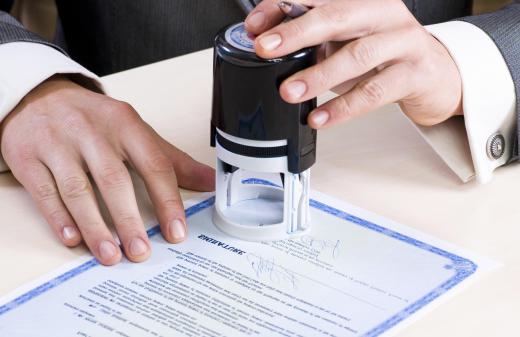A certified copy is a duplicate copy of a legal document that is validated as a true, legally-recognized reproduction of the original documentation. The exact details and requirements of a certified copy vary by region, but there are a few factors applicable to nearly all legal documents of this type, regardless of geographic location. A certified copy is frequently a photocopy and bears the seal and/or signature of a notary public or another individual who represents the institution that issues the document.
Certified copies can be obtained for a variety of reasons. Birth certificates, marriage certificates, divorce decrees, school transcripts, and public records are all examples of documents typically obtained in certified copy form. It is important to remember that a certified copy does not mean that the information on the document is correct or authentic; it simply states that the copy is a true reproduction of the original document. In other words, if the original document is incorrect, the certified copy will be as well.

Different locations have different rules surrounding certified copies. In the United States, for example, many states allow certified notary publics to verify and validate copies as true duplicates of the original. In most states, the notary public will stamp the copy with a special seal that slightly raises a small portion of the paper in a unique design. The design usually bears the official seal of the state in which the notary public is certified.

There are no governmental rules relating to certified copies in Australia. Australians primarily utilize a certified copy as a way to illustrate that a photocopy is an accurate reproduction of the original document. Given that no laws are in place dictating the parameters of a certified copy, they can be acquired with little fuss from a variety of administrative offices. A certified copy of identification is one of the most common types of certified copies in Australia.
Certified copies of identification are also easily obtained in the United Kingdom. Post offices can perform this function, and for a nominal fee, an individual can have the post office study, verify, and validate up to three copies of legal documentation. While not all post offices in England can perform this function, many do offer the service and will typically advertise this fact. The authorized individual will closely look over both documents, write the words "This copy is a true likeness of the original" on the copy, sign the copy, and stamp it.
